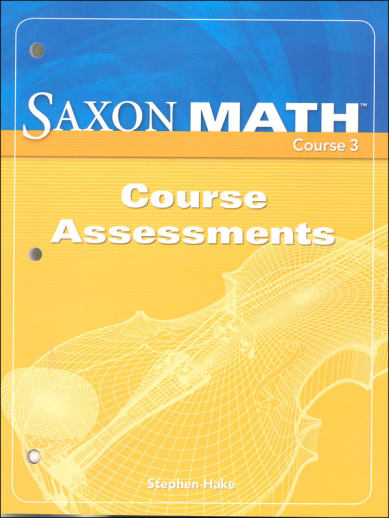Designed as a classroom curriculum and now available to the homeschool market, Saxon Math Course 1, Course 2 and Course 3 are a 2012 version of Saxons middle school math and are roughly comparable to Math 7 6, Math 8 7 and Algebra 1/2. They are designed to be the sequel for the Math Intermediate Series and to prepare the student for Saxon Algebra 1 & 2 (4th ed.).
Course components include a Student Text, a Solutions Manual, a Power-Up Workbook and a Course Assessment Book.[There is also a Teachers Manual for each course that we do not sell.] The Saxon incremental methodology is evident in these courses as is their commitment to continual review and repetition.
The hardcover Student Text provides all the daily instruction and assignments. As is Saxons norm, the text is no-nonsense but attractive in a clean-cut way. An accent color helps illustrate concepts and provides some organizational structure. There are 120 daily Lessons plus 12 Investigations (practical application) in each course. Groups of ten Lessons and one Investigation are wrapped into a Section, each of which has a particular focus and includes particular mathematical strands. Daily Lessons follow a pattern that will be familiar to Saxon users. A Power Up (Building Power) section reviews math facts and provides mental math problems as well as a problem solving dilemma (i.e. problem). The New Concept (Increasing Knowledge) segment provides instruction (written directly to the student), worked examples and a short Practice Set for reinforcing what has just been learned. Written Practice (Strengthening Concepts) is a longer set of problems that reviews and continues practice on concepts cumulative from the start of the book.Early Finishers (not included with every lesson) are a few real-world application problems available to students who complete the assignment early.The Solutions Manuals include both answers and solutions. This is an answer key to: Power-Up facts, Mental Math and Problem Solving. There are solutions to the following: Assessments, Practice Sets, Written Practice, and Early Finishers. [Please note that answers and solutions to some sets of exercises are only available to those with the Teachers Manual. Also, at this time there are several errors in the Course 2 Solution Manual (problems in the textbook not matching the solutions).]
Power-Up Workbooks provide one page warm-ups for each lesson. These include Facts Practice, Mental Math, and Problem Solving exercises.
Course Assessments Book provides: Placement Test, Baseline Test, Power-Up Tests, Cumulative Tests (taken after every five lessons beginning with Lesson 10 with two versions of each) and Benchmark Tests, as well as answer sheets and an End-of-Course Exam. There is also explanatory information about each of the tests and answer forms. The Placement Test covers Math 54 through Course 3 and includes an answer key plus placement guide. The multiple-choice Baseline Test gauges the skills of an incoming student and should be given early in the school year. The content covers skills and concepts that are included in the math curriculum of the preceding year. This test might be totally unnecessary if youre a continuing Saxon student but if coming into Saxon from another series, it could be helpful to determine if the course is the right one. Solutions for this test are in the Solutions Manual. Power Up Tests are given along with the Cumulative Tests and are designed as a quick assessment of fact recall. Benchmark Tests serve as quarterly exams or to help identify concepts which need additional instruction and practice. The End-of-Course Exam (multiple choice) is a final exam. This Course Assessments Book is expensive and may be necessary if you need to provide tests for an overseeing agency. Written Practices are cumulative, however, and will provide much the same information if taken under testing conditions. The Assessments Book is reproducible for a classroom.
This series from Saxon is a more recent version of their middle school math. Although Course 1 compares roughly to Math 7 6 and Course 2 compares roughly to Math 8 7, there are significant differences between Course 3 and Algebra 1/2. The homeschool editions of Math 5 4, 6 5, 7 6, and 8 7 along with Algebra 1/2 appear to be a bit more advanced at each level than their Course counterparts. This is noticeable when comparing the placement tests from each series. Although there are similar types of problems, computational difficulty appears to be stronger in the older homeschool edition. As mentioned earlier, there is a TM (and a couple of other resources) for this series that is not available to us. However, each course is totally do-able with the components available. ~ Janice
Saxon Math Courses 1, 2, and 3 integrate and distribute traditional units, giving students time to learn and practice skills throughout the year, master content, and develop algebraic thinking for mastery of the Common Core State Standards.

